Dogs have earned their reputation as “man’s best friend,” providing companionship, love, and loyalty to countless families. However, even the most well-behaved dogs can exhibit aggressive behavior when provoked or startled. When a dog bite occurs, it can result in physical injuries, emotional trauma, and medical expenses. In such cases, understanding your legal rights and recourse through personal injury claims is crucial. In this article, we will delve into the complexities of dog bites, explore the legal principles surrounding personal injury claims, and discuss how victims can seek justice and compensation for their injuries.
Understanding Dog Bites
Dog bites can happen suddenly and unexpectedly, leaving victims with painful injuries and psychological scars. While many dogs are friendly and pose no threat to humans, others may become aggressive due to various factors, including fear, territorial instincts, or past trauma. Some common scenarios leading to dog bites include:
- Provocation: Dogs may bite if they feel threatened, cornered, or provoked. This can occur when someone enters a dog’s territory, disturbs them while eating, or engages in rough play.
- Fear: Dogs may bite out of fear if they perceive a threat or danger. This can happen when a dog is confronted by a stranger or when loud noises startle them.
- Protectiveness: Dogs are naturally protective of their owners and may bite if they sense a threat to their family members or property.
- Pain or Illness: A dog in pain or suffering from an illness may react aggressively when touched or approached.
Liability in Dog Bite Cases
Liability in dog bite cases varies depending on the jurisdiction and the specific circumstances of the incident. Generally, there are three main legal theories under which dog bite cases are pursued:
- Strict Liability: In some states, there is strict liability for dog owners, meaning that the owner is held responsible for a dog bite, regardless of the dog’s past behavior or the owner’s knowledge of aggression. This means that if a dog bites someone, the owner is liable for the victim’s injuries.
- Negligence: In states without strict liability, dog bite cases are pursued under the negligence theory. This requires the victim to prove that the dog owner was negligent in controlling or restraining the dog, and that negligence resulted in the bite.
- One-Bite Rule: In a few states, the “one-bite rule” is followed. This means that a dog owner is only held liable for a dog bite if they were aware of their dog’s aggressive tendencies or if the dog had bitten someone before. Essentially, it allows one “free bite” before liability is established.
It’s important to note that even in states with strict liability or negligence laws, certain defenses may apply. For example, if the victim was trespassing on the dog owner’s property or provoking the dog, it may impact the outcome of the case.
Steps to Take After a Dog Bite
If you or a loved one is bitten by a dog, taking the following steps can help protect your health and legal rights:
- Seek Medical Attention: Your health should be your top priority. Clean the wound thoroughly and seek medical attention immediately. Dog bites can lead to infections and other complications if not treated promptly.
- Document the Incident: Gather information about the dog and its owner, including their contact details and the dog’s vaccination history. Take photos of your injuries and the scene of the incident.
- Report the Incident: Report the dog bite to local animal control authorities or law enforcement. This documentation can be crucial in establishing liability.
- Get Witness Statements: If there were witnesses to the incident, obtain their contact information and statements about what they saw.
- Keep Records: Maintain records of your medical treatment, including doctor’s visits, medications, and any follow-up care. This documentation will be important in calculating your damages.
Personal Injury Claims for Dog Bites
When a dog bite results in injuries, victims may pursue personal injury claims to seek compensation for their damages. These claims typically include the following elements:
- Medical Expenses: Compensation for past and future medical bills related to the dog bite, including doctor’s visits, surgeries, medications, and therapy.
- Lost Wages: Reimbursement for income lost due to the dog bite, including missed work days, reduced earning capacity, or disability.
- Pain and Suffering: Compensation for physical pain, emotional distress, and trauma resulting from the dog bite and any resulting scarring or disfigurement.
- Property Damage: Coverage for any personal property that was damaged or lost during the dog attack.
- Legal Costs: Recovery of attorney fees and legal costs associated with pursuing the personal injury claim.
Legal Recourse for Victims
Victims of dog bites have the legal right to seek compensation for their injuries and losses. Personal injury lawyers play a vital role in assisting dog bite victims with their claims:
- Case Evaluation: Personal injury lawyers assess the merits of potential dog bite cases. They review the circumstances surrounding the incident, evaluate liability, and determine the viability of the claim.
- Gathering Evidence: Lawyers have the resources and experience to collect critical evidence, including medical records, witness statements, dog ownership information, and any other documentation relevant to the case.
- Determining Liability: Lawyers identify the legal theory under which the dog bite case will be pursued, whether it’s strict liability, negligence, or another legal basis. They also assess any defenses that may be raised by the dog owner.
- Negotiating with the Dog Owner’s Insurance Company: In many cases, dog bite claims are handled through the dog owner’s homeowner’s insurance policy. Lawyers engage in negotiations with the insurance company to seek a fair settlement on behalf of their clients.
- Preparing for Trial: While many dog bite cases are resolved through settlements, lawyers must be prepared to take cases to trial if necessary. They conduct thorough trial preparations, including witness interviews, evidence presentation, and courtroom strategy.
- Advising on Documentation: Lawyers guide clients on the importance of documenting their injuries, medical treatment, expenses, and other damages. Proper documentation is essential for establishing the extent of the harm suffered.
- Providing Emotional Support: Dog bite cases can be emotionally distressing. Lawyers offer support and guidance to clients who may be dealing with physical and psychological trauma.
Conclusion
Dog bites can result in serious injuries and lasting trauma for victims. When such incidents occur, it’s essential to understand your legal rights and recourse. Personal injury lawyers specializing in dog bite cases can provide the necessary legal support and representation to help victims seek justice and compensation for their injuries and losses. If you or a loved one has been bitten by a dog, consulting with a skilled personal injury lawyer can make a significant difference in the outcome of your case, ensuring that you receive the compensation you deserve while holding the responsible parties accountable for their actions.










